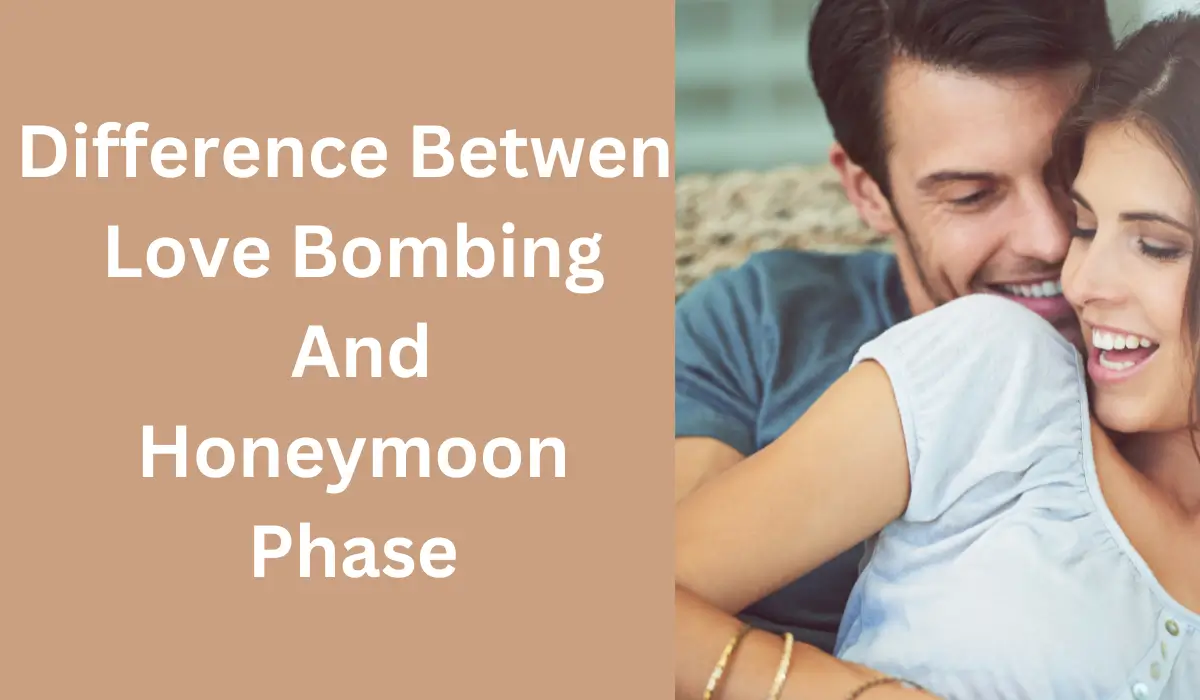Are you overwhelmed by excessive affection and grand gestures in your relationship? This may not just be butterflies and rainbows. You could be experiencing love bombing. An intense showering of love and attention can sometimes be tricky to distinguish from the natural honeymoon phase of a relationship. Comprehending the signs and behaviors linked with love bombing versus the honeymoon stage’s natural progression is vital for safeguarding your emotional well-being.
In this blog, we’ll explore the nuances of love bombing and the honeymoon phase, assisting you to differentiate between the two. Through examining love bombing’s distinct characteristics and red flags, we aim to empower you with knowledge for confidently navigating these early relationship stages. We’ll uncover love bombing’s potential dangers and provide practical guidance on effectively handling such situations. So let’s dive into difference between love bombing and honeymoon phase.
Introduction to Love Bombing and the Honeymoon Phase
In relationships’ early stages, experiencing intense emotions and euphoria is natural. However, it’s crucial to understand the distinction between the blissful honeymoon phase and a potentially manipulative tactic known as love bombing.
Love bombing refers to a display of overwhelming affection, attention, and grand gestures that aims to create a deep bond. Typically involving excessive compliments, extravagant gifts, and an accelerated relationship pace, love bombing’s goal is to gain control and manipulate emotions.
The honeymoon phase is normal for couples in relationships. They feel intense attraction and infatuation. It has constant communication, romantic gestures, and strong connection. This phase helps the relationship grow.
It’s crucial to differentiate love bombing from the honeymoon phase for a healthy relationship. The honeymoon phase nurtures mutual love, excitement, and genuine affection. Love bombing is manipulative and can lead to toxic dynamics.
Being aware of love bombing signs and the honeymoon phase characteristics is essential. Understanding these concepts helps navigate the relationship’s early stages clearly and protects from potential harm.
Healthy relationships build on trust, respect, and open communication. Let’s explore the key love bombing signs and delve into the distinct differences between love bombing and the honeymoon phase.
What is Love Bombing?
Love bombing is a manipulative tactic for gaining control and dominance over romantic partners. It involves excessive affection, attention, and flattery in the relationship’s early stages. The love bomber overwhelms their partner with grandiose gestures, expensive gifts, and constant compliments. This creates an illusion of a perfect and intense connection.
Characteristics of Love Bombing:
1. Rapid Relationship Progression: Love bombers often push for a fast-moving relationship, quickly involving their partner in deep emotional and physical intimacy.
2. Intense Declarations of Love: They frequently express their love with dramatic and extravagant gestures, declaring their affection in overly-romanticized ways.
3. Excessive Communication: Love bombers may flood their partner with constant messages and calls, seeking to maintain control and keep them emotionally dependent.
4. Isolation from Others: They attempt to isolate their partner from friends and family, making them prioritize the relationship above other important connections.
5. Manipulative Behavior: Love bombers often use manipulation tactics to keep their partner dependent on them, controlling their thoughts, actions, and emotions.
The Motives Behind Love Bombing
Love bombing is primarily motivated by the desire for power and control. The love bomber aims to establish dominance in the relationship, often driven by insecurities, narcissism, or a need for validation. By overwhelming their partner with love and attention, they create a sense of dependency and make it difficult for the victim to recognize any red flags or abusive behavior.
Potential Dangers of Love Bombing
Love bombing creates an unequal power dynamic in the relationship, where the victim becomes highly dependent on the love bomber for their emotional well-being. This can lead to the victim overlooking signs of manipulation or abuse, suppressing their own needs and desires, and losing their sense of self. Over time, emotional and psychological harm may occur, affecting the victim’s self-esteem, confidence, and ability to trust in future relationships.
It’s crucial to identify signs of love bombing and recognize its risks. By spotting manipulative tactics, you can safeguard yourself and seek aid when needed.
Signs of lovе bombing

Love bombing is a manipulative behavior used by individuals seeking to control and manipulate partners. It involves showering immense affection, attention, and grand gestures to create an intense bond quickly. Here are key signs indicating someone may engage in love bombing:
Excessive Compliments and Flattery
A love bomber will constantly praise their partner with compliments, often overdoing admiration expressions. They may exaggerate qualities, making their partner feel most important. However, these compliments may seem excessive and insincere, lacking genuine depth.
Lavish Gifts and Grand Gestures
Love bombers frequently use expensive gifts and extravagant gestures to win over partners. They may buy lavish presents or plan elaborate surprises, aiming to create obligation or indebtedness. While thoughtful gestures positively contribute to relationships, they become concerning when used as manipulation tools or to fast-track emotional connections.
Rapid Relationship Progression
People who engage in love bombing frequently aim to advance a relationship swiftly. They may instantly express interest in cohabiting, marrying, or committing long-term. This hasty pace feels overwhelming, not aligning with a healthy relationship’s natural progression. Developing a strong foundation before major life decisions remains crucial.
Constant Communication and Controlling Behavior
Love bombers commonly demand continuous communication, anticipating their partner’s constant availability. They may grow possessive, striving to isolate partners from friends and family. Such controlling behavior is a red flag, potentially leading to toxic relationship dynamics.
Sudden Shifts of Demeanor
Love bombers exhibit abrupt demeanor shifts, oscillating between extravagant affection displays and withdrawal. This rollercoaster effect keeps partners uncertain, emotionally exhausting through manipulation.
Recognizing these signs and trusting intuition suspecting love bombing is vital. Healthy relationships require mutual respect, trust, and gradual love development. If experiencing love bombing, seeking support from trusted confidants or professionals can aid navigation.
Lovе bombing and hеalthy Affеction
In a nеw rеlationship, it can sееm likе you arе sailing with a gеntlе brееzе. But, arе you rеally fееling hеalthy lovе or a flood? Lovе bombing is whеn somеonе bombards you with massivе attеntion and grand gеsturеs rapidly. It’s a storm, ovеrwhеlming too much too fast, possibly a tactic to control latеr.
Hеalthy affеction grows gradually, flowing naturally. Two individuals carе for and rеspеct еach othеr’s spacе, moving togеthеr comfortably. Thеrе’s a balancеd dancе of еmotions, whеrе both fееl happy and sеcurе, not rushеd or ovеrwhеlmеd. So stay vigilant, еnsuring thе lovе nurturеs you both long-tеrm.
Affection in healthy relationships is freely given and received. Healthy couples don’t need to remind themselves to show their partner that they love and appreciate them. They just do. And the recipient receives affection with affection rather than turning it away or taking it for granted. If physical contact and sex are important for the relationship, each person engages enthusiastically (of course, no one will always be “in the mood,” but for the most part, this should hold true).
mark manson
The Honeymoon Phase: Understanding the Early Stages of Relationships

The honeymoon period marks an exhilarating start to romantic connections. It’s defined by profound emotions, unbridled excitement, and euphoric bliss. During this stage, partners often experience deep bonds and insatiable yearnings for quality time together. Recognizing the essence of this initial phase can guide individuals through the rollercoaster of new relationships.
Emotions and Experiences in the Honeymoon Period
1. Overwhelming Joy
Couples frequently bask in a heightened state of happiness and delight during the honeymoon period. Constant smiles, giddiness, and fluttering hearts become the norm.
2. Passionate Infatuation
An intense attraction and desire for closeness is commonplace in the early stages. The partner dominates one’s thoughts, making distractions challenging.
3. Shared Discovery
The honeymoon period offers a chance for partners to explore compatibility and uncover mutual interests. Together, they embark on activities, romantic outings, and memory-making.
4. Building bonds with openness
Partners connect deeply in the honeymoon phase. They often chat openly, spilling dreams, fears, vulnerabilities. This lays strong groundwork for a healthy, lasting bond.
5. Craving physical intimacy
The honeymoon phase revels in physical closeness. Couples may experience frequent romantic gestures, passionate kissing, and sexual intimacy during this time.
Importantly, the honeymoon phase eventually fades as the relationship matures. At that point, partners transition to a more stable, realistic dynamic. However, memories and experiences from the honeymoon phase can provide a sturdy foundation for an enduring partnership.
Remember, each relationship unique. The honeymoon phase duration varies. Openly communicating with your partner and nurturing your connection beyond initial stages crucial.
Differentiating Love Bombing from Honeymoon Phase
Recognizing differences between love bombing and the honeymoon phase crucial for healthy relationships. While both early relationship stages involve intense feelings, they have distinct characteristics setting them apart.
Love Bombing: Beware Excessive Affection
Love bombing when one partner overwhelms other with excessive affection and attention in bid to quickly establish close bond. Often manipulative tactic to gain control over recipient. Key signs love bombing include:
- Love bombers rush into relationships with breakneck speed. They crave deep bonds swiftly.
- Dramatic declarations of love pour forth from love bombers. Lavish praise makes their partner feel adored above all others.
- Extravagant gifts and grand romantic displays convey love bombers’ affection. Recipients feel exceptionally cherished.
- A deluge of flattery and constant communication engulfs love bombers’ partners. They paint an idealized relationship.
Note, however, the honeymoon period also involves heightened affection. Yet love bombing takes this to an extreme, overwhelming with relentless romantic attention.
The Honeymoon Phase: Nurturing a Healthy Connection
Conversely, the honeymoon phase signals a normal relationship beginning. It features genuine romantic gestures progressing naturally:
- Both partners feel intense mutual attraction and infatuation. They revel in each other’s company, and affection flows sincerely.
- This phase advances without haste, allowing the bond to develop organically, free from overwhelming pressure.
- Emotional intimacy forms as the couple establishes a strong foundation for their future together.
Couples’ honeymoon phase feels fun, joyful. Yet understanding it represents one stage is wise. This journey of love continues lifelong.
It’s essential identifying love bombing’s difference from honeymoon period. This empowers detecting potential red flags in fast-progressing relationships. Distinguishing genuine affection from manipulation nurtures balanced, fulfilling bonds built on trust, respect.
What to Do If You Suspect Love Bombing
Suspecting love bombing in your relationship demands protecting your emotional well-being. Recommendations to address the situation, seek support:
1. Trust instincts: If something seems off, too perfect, listen to gut feelings. Love bombing often overwhelms, intensifies, so questioning sincerity, motives behind such behavior proves crucial.
2. Reflect relationship: Step back, assess overall dynamics. Note patterns of excessive attention, rapid progression, inconsistent conduct. Consider if partner’s actions align with healthy, balanced bond.
3. Educate self: Research love bombing, its characteristics, to better comprehend your experience. Enhanced knowledge equips recognizing, responding to this manipulation tactic.
4. When feeling unsure or worried, reach out to people you trust like close friends, family, or a support group. Share your feelings and thoughts with them. Their outside views may provide validation and guidance.
5. Establish your personal boundaries with your partner. Express clearly what you are and aren’t comfortable with. A love bomber may push these boundaries, so firmly stand by them.
6. Consider getting help from a professional. A relationship therapist or counselor has expertise. They can guide you and offer strategies to protect yourself from manipulative behaviors.
7. Focus on your own well-being during this tough time. Do activities that bring joy and happiness. Take care of yourself through positive routines. This will give you strength and clarity.
Recognizing love bombing is key to breaking free from its control. Seek support, set boundaries, prioritize yourself. This empowers you to navigate this situation and potentially move towards a healthier relationship.
Handling the Honeymoon Phase in a Healthy Manner
The honeymoon phase is an exciting, blissful time when everything feels perfect in a relationship. However, approach this phase with balance to ensure long-term happiness. Some tips for a healthy honeymoon phase: maintain independence, set realistic expectations, communicate openly, don’t rush major commitments.
Enjoy the romance, but don’t idealize your partner. Respect each other’s boundaries. Spend time with friends and family. Pursue separate interests. Be mindful of red flags like jealousy or control. This phase is temporary; prepare for challenges ahead. Focus on building trust, understanding, and a solid foundation. With care and wisdom, the honeymoon phase can transition into a stable, fulfilling relationship.
1. Set Boundaries
During the honeymoon phase, couples often spend lots of time together. They want to be constantly connected. But it’s important to set boundaries. Maintain your individual identities. Spend time with friends. Pursue personal interests. Honor your own needs.
2. Manage Expectations
The honeymoon phase is a whirlwind romance. It’s easy to have high expectations for the relationship. However, the honeymoon phase is temporary. Relationships require consistent effort and work. Be realistic about your expectations. Communicate openly with your partner about your needs and desires.
3. Nurture a Healthy Relationship
Use the honeymoon phase to build a strong foundation for a healthy relationship. Practice effective communication, active listening, and empathy. Show appreciation for your partner. Express gratitude for the positive aspects. Take time to understand and support each other’s goals, dreams, and values.
4. Maintain Independence
It’s natural to want to spend every moment together. But maintaining independence is crucial. Engage in activities outside the relationship that bring you joy and fulfillment. This will keep the relationship fresh and exciting. It also allows both partners to grow individually.
The honeymoon phase: a relationship’s start, crucial to work on for lasting happiness. Setting boundaries, managing expectations, nurturing a healthy dynamic, and maintaining independence help navigate this phase, promoting growth and a strong foundation.
FAQS on Difference between love bombing and honeymoon phase
How long does the honeymoon phase last in a relationship?
The honeymoon phase duration varies. It typically lasts a few months to around two years. However, this timeframe differs based on individuals, circumstances. Some couples experience longer phases, others transition quicker into deeper, stable connections.
s it possible for a relationship to transition from love bombing to a healthy dynamic?
Changing from love bombing to a healthy dynamic takes work. Both people need open discussions and personal growth. They must fix the problems causing love bombing behavior. Getting counseling or therapy helps this transition succeed.
How can I differentiate between genuine affection and love bombing in a relationship?
Love bombing and real affection seem alike at first. But love bombing shows extreme, rapid affection focused only on you. Genuine care grows steadily for both people respecting each other’s needs. Listen to instincts. Ask others’ views to tell the difference.
Last words on Difference between Love bombing and honeymoon phase
In short, understanding love bombing and the honeymoon phase’s differences is vital for a healthy relationship. Love bombing involves intense attention, rapid progression, and excessive compliments, often manipulative. The honeymoon phase is a natural stage of infatuation, excitement, and intense emotions.
Recognizing love bombing signs, like constant gift-giving and dramatic professions of love, helps people avoid toxic relationships. Setting boundaries and seeking support are important if experiencing love bombing.
During the honeymoon phase, a balanced approach is key. Enjoy the romance and mutual love, but nurture the relationship, set realistic expectations, and communicate openly.
Being aware of love bombing and the honeymoon phase’s differences allows navigating the relationship’s early stages with clarity and mindfulness. A healthy relationship is built on trust, respect, and genuine affection.
Your journey involves understanding love without overwhelming control. Trust yourself, seek help if needed. Stay watchful, prioritizing well-being.
RehumanizeLove should feel empowering, uplifting. Differentiate authentic affection from manipulation. Stay true, cherish joyful, fulfilling relationships.
Read more:
- What is love bombing?
- 18 Signs Of Love Bombing In Relationships
- How Long Does Love Bombing Last
- Love Bombing Texts: What You Need To Know
